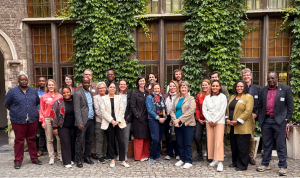[:en]
Written by Dr Emilyn Costa Conceição
In early June 2025, I had the opportunity to attend the second annual meeting of GenPath Africa, a project that’s working to strengthen Africa’s ability to track and respond to infectious diseases using genomic surveillance, a way of studying the DNA of viruses, bacteria, and other pathogens to understand how they spread and evolve.
This year’s meeting was held in the beautiful Hof van Liere at the University of Antwerp in Belgium, a setting rich in history and well-suited to a project with such an ambitious, future-focused goal. It was a hybrid event, which meant some of us were there in person, while others joined virtually from across Africa and Europe. Either way, the energy and sense of shared purpose were truly inspiring.
What Is GenPath Africa All About?
At its core, GenPath Africa is about preparing the continent to better detect, understand, and respond to infectious diseases, from drug-resistant TB to viral outbreaks like Rift Valley Fever. Funded by the European & Developing Countries Clinical Trials Partnership (EDCTP) and part of the broader GenEpi Network, the project is structured around six projects, each one led by passionate scientists and institutions across Africa and Europe.
The work covers everything from developing lab tools and sequencing pathogen genomes, to improving data sharing, training future scientists, and ensuring our efforts translate into real-world public health improvements.
A Strong Showing from Stellenbosch
Seventeen researchers from Stellenbosch University joined the meeting, representing the Faculty of Medicine and Health Sciences (FMHS) and the School for Data Science and Computational Thinking. As part of the TB Genomics and CERI teams, I was proud to be among them, contributing to discussions on tracking drug-resistant tuberculosis (DR-TB), a major focus of my project research working package.
Our university was involved across the board, from lab-based bioinformatics to communication strategies and capacity building. Seeing such a wide range of skills and disciplines come together in one place reminded me just how important collaboration is in tackling health issues that know no borders.
Second Annual GenPath Africa Consortium Meeting – Group Picture. Photo credit: LINQ Management GmbH.
Why This Meeting Mattered
This wasn’t just a check-in on project milestones, it was a moment to reconnect, reflect, and refocus. We had the chance to present emerging results, brainstorm solutions to challenges, and build stronger connections with colleagues working in very different but equally vital areas. In a world where disease threats are becoming more complex and more frequent, this kind of interdisciplinary teamwork is not just helpful, it’s essential.
For me personally, it was a reminder that while the tools we use may be cutting-edge, the work itself is deeply human. It’s about protecting lives, building stronger systems, and making sure the benefits of science are shared widely and fairly.
Looking Ahead
The work of GenPath Africa continues through 2027, and meetings like this give us the momentum we need to keep pushing forward. As researchers, we often focus on the details of our own projects or datasets, but being part of a consortium like this helps us zoom out and see the bigger picture. It’s not just about sequencing DNA, it’s about building a healthier future for everyone.
To find out more about the project and highlights from the annual meeting, you can visit the GenPath Africa website:
👉 https://www.genpath-africa.org/news/blog/genpath-annual-meeting-2025[:]


